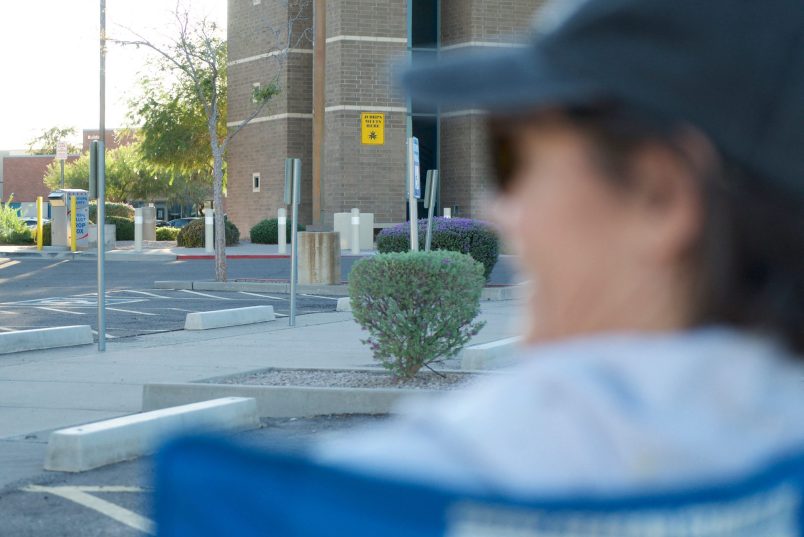A federal judge issued a temporary restraining order on Tuesday evening against a far-right group accused of intimidating voters in Arizona.
Voting rights groups filed two lawsuits against the group, Clean Elections USA, over the past few weeks after they organized members to surveil drop boxes throughout Arizona, seeking to prevent supposed “ballot fraud.” The federal judge merged the suits.
Clean Elections USA was launched earlier this year by an Oklahoma woman named Melody Jennings, who’d organized the group on Truth Social. They drew national attention last week after the Arizona secretary of state’s office received multiple complaints alleging that its members filmed, photographed, and accused voters depositing their ballots of being “mules.”
A second group, Lions of Liberty, was sued for similar activities last week, but decided to stop monitoring drop boxes on their own.
In a stipulated order — meaning that both parties agreed to it — U.S. District Court Judge Michael Liburdi on Tuesday evening granted the Arizona Alliance for Retired Americans a temporary restraining order against Clean Elections USA, barring the group from being within 75 feet of a drop box or entrance to a building where a drop box is located; following voters when they are not within 75 feet of a drop box; speaking or yelling at voters while returning their ballots; and openly carrying firearms or wearing body armor within 250 feet of a drop box.
Clean Elections USA was inspired by “2000 Mules,” a much-debunked propaganda film that claimed to have found evidence that shadowy nonprofits had hired “ballot mules” to stuff drop boxes in key swing states during the 2020 election. Jennings cited a teaser trailer for the film as her inspiration for the group.
The groups had each sent volunteers to stake out drop boxes in Yavapai and Maricopa Counties, the suits alleged Clean Elections USA’s plan revolved mostly around either preventing or finding evidence of ballot stuffing, but Lions of Liberty took their plan a step further by getting law enforcement involved. According to the lawsuit against the latter, the group planned to report voters they suspected of conducting voter fraud to the Yavapai County Sheriff.
Liburdi initially refused to issue a temporary restraining order on Friday in the first case brought against Clean Elections USA on the grounds that doing so would conflict with core First Amendment rights. The DOJ has weighed in on the cases on Monday, arguing it was possible to narrowly tailor his decision to avoid that trap.
It’s unclear how the volunteers intended on identifying “ballot mules” from those for whom it’s legal in Arizona to drop off multiple ballots at a time. The defendants’ attorney argued on Tuesday that Jennings didn’t make false statements about who’s allowed to return what ballots, just “incomplete” statements.
Liburdi, in his Tuesday order, also required Jennings to post the following statement to Truth Social to clear up any misunderstandings: “It is not always illegal to deposit multiple ballots in a ballot drop box. It is legal to deposit the ballot of a family member, household member, or a person for whom you are the caregiver.”
The restraining order will go into effect immediately and will last for fourteen days, well past Election Day.



